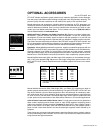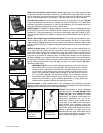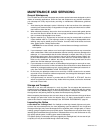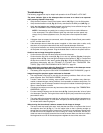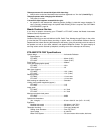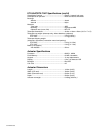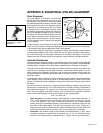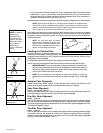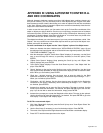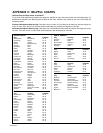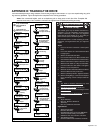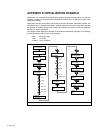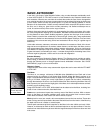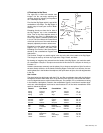
A Roadmap to the Stars
The night sky is filled with wonder and
intrigue. You too, can enjoy exploring the
universe simply by following a few pointers
on a roadmap to the stars.
First, find the Big Dipper which is part of the
constellation Ursa Major. The Big Dipper is
usually easy to locate year round in North
America.
Extending directly out from the far side of
the Big Dipper’s cup is the constellation
Orion. One of the most exquisite areas of
the winter sky, Orion is distinguished by
Orion’s belt, which is marked by three stars
in a row. The Orion Nebula is located South
of the belt and is one of the most observed
deep-sky objects by amateur astronomers.
Extending from the “pointer stars” of the Big
Dipper’s cup is Polaris, the North Star.
Extending from Polaris is the Great Square
shared by the constellations Pegasus and
Andromeda. .
The Summer Triangle is a notable region in the sky to the left of the handle of the Big Dipper.
The triangle is made up of three very bright stars: Vega, Deneb, and Altair.
By drawing an imaginary line outward from the handle of the Big Dipper, you reach the south-
ern constellation “Scorpius.” Scorpius curves to the left like the tail of a scorpion in the sky, or
like letter “J.”
Amateur astronomers commonly use the phrase “Arc to Arcturus and spike to Spica” to refer to
the area directly off the arc in the handle of the Big Dipper. Follow the arc to Arcturus, the sec-
ond brightest star in the Northern Hemisphere, then spike down to Spica, the 16th brightest star
in the sky.
Star Locator
The chart below lists bright stars with their R.A. and Dec coordinates, along with the Northern
Hemisphere season when these stars are prominent in the night sky. This list aids the observ-
er to find alignment stars at various times of the year. For example, if it is a midsummer evening
in the Northern Hemisphere, Deneb in the constellation Cygnus, would be an excellent align-
ment star, while Betelgeuse could not be used because it is in the winter constellation Orion
and thus, below the horizon.
Season Star Name
Constellation
R.A. Dec
Spring Arcturus Bootes 14h16m 19° 11"
Spring Regulus Leo 10h09m 11° 58"
Spring Spica Virgo 13h25m -11° 10"
Summer Vega Lyra 18h37m 38° 47"
Summer Deneb Cygnus 20h41m 45° 17"
Summer Altair Aquila 19h51m 08° 52"
Summer Antares Scorpius 16h30m -26° 26"
Fall Markab Pegasus 23h05m 15° 12"
Fall Fomalhaut
Pisces Austrinus s
22h58m -29° 38"
Fall Mira Cetus 02h19m -02° 58"
Winter Rigel Orion 05h15m -08° 12"
Winter Betelgeuse Orion 05h55m 07° 25"
Winter Sirius Canis Major 06h45m -16° 43"
Winter Aldebaran Taurus 04h35m 16° 31"
Orion
Gemini
Andromeda
Pegasus
Aquila
Lyra
Cygnus
Boötes
Virgo
Scorpius
Leo
“Big Dipper”
“Summer
Triangle”
Polaris
Betelgeuse
Rigel
Pollux
Castor
“Sickle”
Regulus
Deneb
Vega
Antares
Altair
Arcturus
Spica
Fig. 36: Road Map to the Stars.
Basic Astronomy 39



